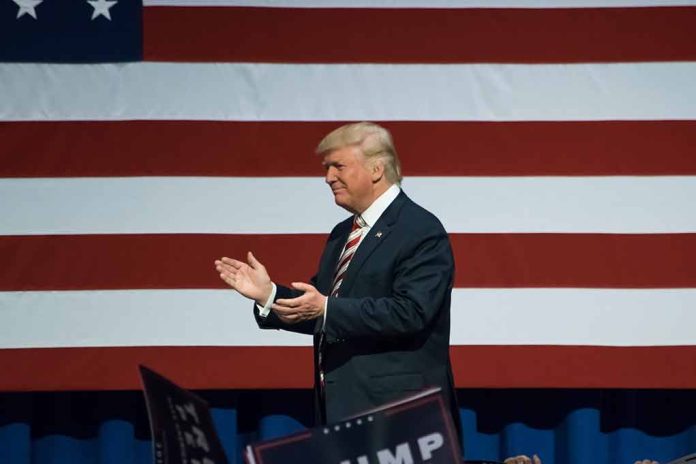
The Trump administration has halted New York City’s controversial congestion pricing program, igniting a fierce battle between state and federal authorities over infrastructure tolling.
Key Takeaways
- The Trump administration has revoked federal approval for New York City’s congestion pricing tolls.
- Transportation Secretary Sean Duffy argues the tolls unfairly burden motorists outside the city and don’t meet federal exemption standards.
- New York Governor Kathy Hochul vows to sue over the cancellation, asserting state sovereignty.
- The program aimed to reduce traffic and fund public transit, but faced criticism for potentially ineffective congestion reduction.
- The situation highlights the complex relationship between state ambitions and federal regulatory power in transportation policy.
Trump Administration Pulls the Plug on NYC Congestion Pricing
In a surprising move, the Trump administration has terminated federal approval for New York City’s congestion pricing program. The decision, announced by Transportation Secretary Sean Duffy, effectively halts the implementation of tolls for vehicles entering Manhattan’s central business district. This action marks a significant setback for a program that has been years in the making and was touted as a solution to the city’s chronic traffic congestion.
The congestion pricing system, which would have required most vehicles to pay a peak fee for entering lower Manhattan, was designed to alleviate traffic and generate funds for public transit improvements. However, the federal government has now deemed the program non-compliant with federal toll exemption standards, citing concerns that it primarily aims to generate revenue rather than reduce congestion.
“CONGESTION PRICING IS DEAD. Manhattan, and all of New York, is SAVED. LONG LIVE THE KING!" Trump said.
Read more: https://t.co/MUwGDlqKhk
— unusual_whales (@unusual_whales) February 19, 2025
Federal vs. State Authority: A Contentious Debate
The revocation of approval has ignited a heated debate over the boundaries of federal and state authority in transportation policy. Secretary Duffy argued that the federal government has jurisdiction over highways leading to Manhattan and that the tolls would unfairly burden motorists from outside the city. This stance has been met with fierce opposition from New York state officials.
“We tried gridlock for 60 years. It didn’t work, It cost our economy billions. But you know what’s helping our economy? What’s making New York a better place? Congestion pricing.” – Janno Lieber
Janno Lieber, CEO of the Metropolitan Transportation Authority, has vowed to fight the federal decision, emphasizing the potential benefits of congestion pricing for the city’s economy and transportation infrastructure. This clash underscores the complex interplay between local needs and federal oversight in urban planning and transportation policy.
Political Fallout and Legal Challenges
The controversy has quickly become a political flashpoint, with President Donald Trump celebrating the decision on social media and declaring himself “king” for ending the program. This provocative statement has drawn sharp criticism from New York Governor Kathy Hochul, who has promised to sue over the cancellation.
“President Donald Trump tweeted, ‘Long live the king.’ I’m here to say New York hasn’t labored under a king in over 250 years, And we sure as hell are not going to start now.” – Kathy Hochul
The Metropolitan Transportation Authority has already filed a lawsuit against the Trump administration, setting the stage for a protracted legal battle. This confrontation highlights the significant influence the federal government wields over state and local transportation policies, raising questions about the need for congressional action to clarify jurisdictional boundaries.
.@SeanDuffyWI The transportation secretary said he would revoke federal approval for the program, citing the cost to motorists; the Metropolitan Transportation Authority quickly filed a lawsuit to stop the move. https://t.co/aK8Xuk8UaI
— Andrew Revkin 🌎 ✍🏼 🪕 ☮️ (@Revkin) February 19, 2025
Implications for Urban Transportation Policy
The termination of New York’s congestion pricing program may have far-reaching consequences for urban transportation policy across the nation. Critics of the program argue that the tolls were set to maximize revenue rather than effectively reduce congestion, aligning with the Trump administration’s reasoning for cancellation. However, supporters contend that the program was essential for improving public transit and reducing traffic in one of the world’s busiest cities.
As the legal and political battle unfolds, the outcome of this conflict could set a precedent for how cities approach traffic management and infrastructure funding in the future. The situation underscores the need for a delicate balance between local autonomy and federal oversight in addressing complex urban transportation challenges.
Sources:
- Trump administration terminates approval of New York City congestion pricing
- Trump moves to stop congestion pricing tolls in New York City : NPR
- Trump administration moves to end New York City’s congestion pricing | Reuters
- Trump kills New York’s flawed congestion pricing program














